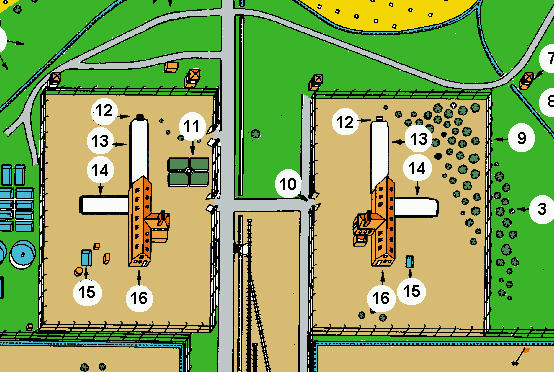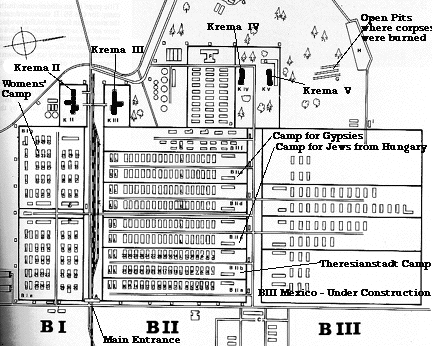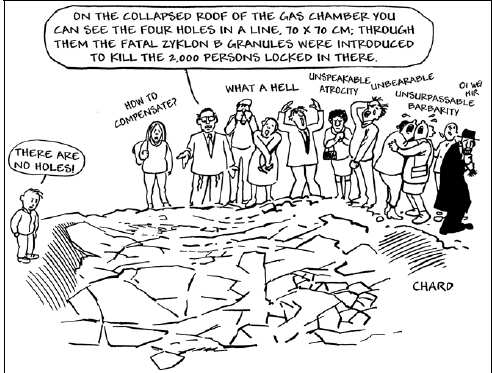

"No holes? No Holocaust!!"
1
[back] Holocaust
revisionism [back]
Birkenau 'gas chamber'
[There is scant evidence for holes (to put in Zyklon B) in the two Birkenau morgues (number 14).]
Faurisson has also boiled the results of his research down to powerful slogans, the most important being the above-quoted “No Holes? No Holocaust!” If there were no holes in the roofs of the alleged gas chambers of the crematoria II and III at Birkenau, and if this fact is not open to scientific examination by experts, then how can we trust ‘survivors’ as reliable ‘witnesses’ who claim that the lethal gas materials were poured down through non-existent holes? One might as well claim to be a survivor of an imaginary sinking ship on an imaginary ocean and then be angry when scientists refuse to accept the tale after being unable to locate the ship and the ocean.
----Dr. Christian Lindtner 1On August 16, 1991, while standing on the collapsed roof of the alleged "gas chamber" of crematorium II in Birkenau, I lost my faith in the "Holocaust," because I could find no holes that deserved the name. [2001] A Brief History of Forensic Examinations of Auschwitz by Germar Rudolf
[2001] Convergence or Divergence?: On Recent Evidence for Zyklon Induction Holes at Auschwitz-Birkenau Crematory II by Brian Renk If Zyklon holes in the roof of Leichenkeller 1 had been there, as described by the most important witnesses within months after the capture of Auschwitz, indisputable evidence of their existence would still be discernible there today. But there is none, and the efforts of the most qualified exterminationist expert and the most diligent exterminationist amateur to account for the absence of that evidence, and of any contemporaneous evidence other than statements from a Soviet show trial and its successors, has produced nothing but a tragicomedy for the Holocaust industry. In fact, there were no Zyklon holes at Crematorium II of Auschwitz-Birkenau, and the absence of those humble openings leaves the Auschwitz myth as blasted as the concrete, and as contorted as this rebar, in the ruins of the morgue there today.
Aerial evidence that there were no vent holes in the roof of an alleged Birkenau gas chamber in 1944
[Kenneth R. Wilson] The 'False News' Trial of Ernst Zündel -- 1988
[2001] A Brief History of Forensic Examinations of Auschwitz by Germar Rudolf On August 16, 1991, while standing on the collapsed roof of the alleged "gas chamber" of crematorium II in Birkenau, I lost my faith in the "Holocaust," because I could find no holes that deserved the name.
[Ditlieb Felderer] The 'False News' Trial of Ernst Zündel -- 1988 Felderer examined and measured the roof over the alleged gas chamber at Krema II. He found only a natural crack and two holes chiselled into the concrete with twisted reinforced steel sticking out. Neither hole was in the position on the roof that the Auschwitz authorities alleged they should have been. A heavy concrete lid lying by one of the holes did not fit. Felderer believed the holes were chiselled out after the war to support the gassing allegation. (19-4423, 4424)
Left is Krema II, right Krema III
Number 14 are below ground level morgues (Leichenkeller),
the alleged gas chambers.
Number 16 are two large cremation buildings built after the summer of 1942.
Number 13 Morgues mostly below ground, this is where the alleged gassing victims
undressed.
Number 12: Stairs to undressing room 13..

Hole # 2 (right hole): The hole was made by breaking the cement, most likely
with a large hammer, and cutting one end of 3 reinforcing iron rods with a
hack-saw before bending them. The hole measures 60 cm. X 50 cm. (2 ft. X 1 ft. 8
"). At this location the roof has collapsed to within 45 cm. (1 ft. 6") of the
broken cement lying on the ground. Had the dark hole existed in 1944, it would
have been visible in air photos, which it is not.
Right hole crudely
broken through cement roof

In 1943 the Germans would have cut straight edges and neatly trimmed the
reinforcing rods. This job appears to be the product of post-war Communists, not
war-time Germans.
Another view showing the jagged edges of the same hole

[See: Fredrick Töben.] It was alleged by important "eye-witnesses" who testified at post-war trials that cyanide pellets were dropped down hollow posts where gas then escaped into the room thorough wire-mesh-covered openings. This was also displayed on the large Auschwitz museum camp-model before it was removed in 1991. This is false as the posts are all solid cement. (photo: 1997) All posts are solid, not hollow

At No. 3 cremation building solid cement posts also protrude through the collapsed roof again proving cyanide pellets could not have been poured down hollow posts. (photo 1997) All posts are solid, not hollow

